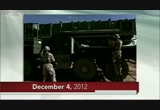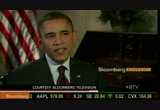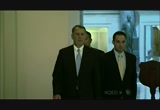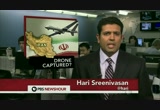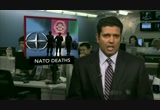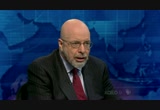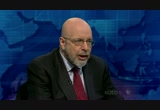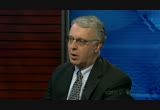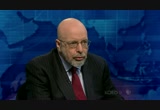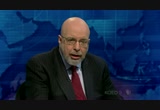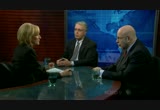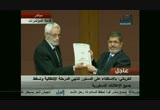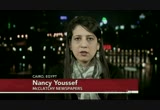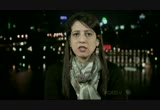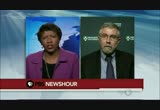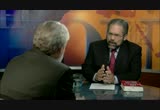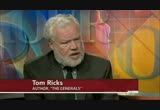tv PBS News Hour PBS December 4, 2012 6:00pm-7:00pm PST
6:00 pm
>> ifill: then we examine nato's decision to send patriot anti- missile systems to turkey, as fears grow that syrian chemical weapons could cross the border. >> woodruff: jeffrey brown talks to mcclatchy newspapers' egypt correspondent nancy youssef about the massive antigovernment protests in cairo today. >> ifill: we continue our series of conversations about the fiscal cliff. tonight we hear from economist paul krugman. >> i don't think there's going to be much of a deal. i think there's going to be a kind of... there will be an outcome. >> woodruff: from haiti, fred de sam lazaro reports on the efforts to stem a deadly cholera epidemic that began after the 2010 earthquake. >> ifill: and ray suarez talks to author and journalist tom ricks about what he describes as the decline of american military leadership. >> today nobody gets credit for anything and mediocrity is accepted as a core value in the performance of generals.
6:01 pm
>> ifill: that's all ahead on tonight's newshour. major funding for the pbs newshour has been provided by: moving our economy for 160 years. bnsf, the engine that connects us. >> and by the bill and melinda gates foundation. dedicated to the idea that all people deserve the chance to live a healthy, productive life. and with the ongoing support of these institutions and foundations. and... this program was made possible by the corporation for public broadcasting.
6:02 pm
and by contributions to your pbs station from viewers like you. thank you. >> ifill: neither side showed signs of budging today as the nation edged closer toward a so- called fiscal cliff that could raise taxes by year's end. we begin with a report from newshour congressional correspondent kwame holman. >> we're going to have to see the rates on the top two percent go up. we're not going to be able to get a deal without it. >> reporter: in his first interview since the election, president obama rejected a proposal from house speaker john boehner. he spoke on bloomberg television. >> unfortunately the speaker's proposal right now is still out of balance. i'm happy to entertain other ideas that the republicans may present. but we are not going to simply cut our way to prosperity or to cut our way out of this deficit problem that we have. we're going to need more revenues. in order to do that, that starts
6:03 pm
with higher rates for the folks at the top. >> reporter: the president did say today he would consider lowering rates again for the top two percent next year as part of a broader tax overhaul. the house republican plan envisions $2.2 trillion in deficit reductions over the next decade. $800 billion would come from new revenues but with no hike in tax rates for top earners. instead the plan relies on $1.2 trillion in reduced spending including $600 billion from changes in medicare and medicaid. at the white house today, the president met with a bipartisan group of governors pressing his own plan for deficit reduction. that proposal, $1.6 trillion in revenue from tax increases on the wealthy and $600 billion in spending cuts mostly from reductions in medicare. he also wants authority to raise the debt ceiling without congressional intervention. but governors emerged afterwards treading a line between the two
6:04 pm
sides. delaware governor jack markel, a democrat, is chairman of the national governors association. >> we came not to embrace one plan or the other. we came to make it very clear, a, why it's so important that something happen both on the economic and on the fiscal issue and, b., to make sure that the president, the white house, the administration and members of congress realize that we are willing partners. >> reporter: republican scott walker of wisconsin and other leaders also urged the burden of medicaid spending for the poor not be shifted to the states. >> we hope there's going to be something that happens here in this nation's capital. in the end we hope it's something that is positive for our states both for our finances but also for our states' economies. >> reporter: according to the governors the president reiterated his commitment to try to get an agreement with republicans here at the capital. but in a statement speaker boehner said the president's plan doesn't have the votes to pass the house. mr. boehner said his plan represents a middle ground. he's ready and eager to talk to
6:05 pm
the president about it. congresswoman kathy mcmorris rogers of washington state is the party's conference chair in the house. >> we're going to either succeed together or we're going to fail together. the president is calling for higher taxes as well as more spending. he's calling for another stimulus. at a time when we need tax reform. we need to be looking at... and the republicans have put forward tax reform that includes closing the loopholes, eliminating some of those tax credits, that will actually impact the wealthiest. >> reporter: some republicans said the boehner plan goes too far in taxing the well-off. south carolina senator jim demint, a staunch fiscal conservative, blasted the plan on twitter today. he said speaker boehner's offer of an $800 billion tax hike will destroy jobs and allow politicians in washington to spend even more. but the senate's democratic majority leader harry reid warned republicans against listening to such voices. >> you can't let these negotiations be dictated by the
6:06 pm
tea party. our guiding principle should be the views of the vast majority of the american people. the math is clear. the only way to accomplish these things is to allow the rates to go up on the top two percent of tax payers. we're not going to twist ourselves into contortions to apiece a vocal minority of the tea party. >> reporter: in turn, senate minority leader mitch mcconnell said president obama needs to ride herd on democrats if there's any hope of agreement. >> only one person in the country can deliver the members of his party to support a deal that he makes. and that's the president. there have been no deals of this magnitude made in modern times in congress and forced on a reluctant president. i would hope the president would turn off the campaign. congratulations you had a great victory. and let's get serious about dealing with this deficit and debt here at the end of the year.
6:07 pm
>> reporter: the partisan back and forth was briefly on hold this evening for the lighting of the capital christmas tree but there was little else in the day's developments to suggest happy holidays. >> woodruff: still to come on the newshour, nato's decision to deploy an anti-missile system to turkey; the massive protest against the government in cairo; paul krugman on the stalemate over taxes and spending; the ongoing cholera epidemic in haiti; and american military leadership. but first, the other news of the day. here's hari sreenivasan. >> sreenivasan: iran claimed today it has captured a u.s. surveillance drone. the "scan-eagle" is used to collect photographic and video images. iranian state television broadcast video of two military commanders examining the aircraft. they said it was seized "in the past few days," but they did not specify where or how. in response, the u.s. navy said none of its unmanned aerial vehicles-- u.a.v.'s-- are missing. and in washington, white house spokesman jay carney raised doubts about tehran's statements.
6:08 pm
we have no evidence that the iranian claims you cite are true. i'd refer you to the pentagon's comments this morning for details about this particular type of u.a.v., but again we have no evidence that the iranian claims are true. >> sreenivasan: a year ago, iran did manage to down a c.i.a. drone that apparently crossed the border from afghanistan. and last month, the u.s. military said another drone came under fire by iran over the persian gulf. it was undamaged. in afghanistan, a bomb blast has killed two nato troops in the country's south. the alliance says the attack happened yesterday. it did not provide the nationalities of those killed. so far this year at least 384 international troops have been killed in afghanistan. most of them have been americans. in economic news, the u.s. housing market showed more signs of recovery in a new report by the real estate data firm, core logic. it said home prices in october were up more than 6% compared with last year. that's the largest gain in more than six years. still, the housing news was not enough to boost wall street's
6:09 pm
spirits. stocks edged lower again as budget talks in washington showed no signs of progress. the dow jones industrial average lost more than 13 points to close at 12,951. the nasdaq fell five points to close at 2996. those are some of the day's major stories. now, back to judy. >> woodruff: we turn now to the conflict in syria. the country's neighbor, turkey, received long-sought-after defense help from nato today. the military coalition also expressed growing concerns about the assad regime's chemical weapons supply. in an all too familiar scenes of civil war, rockets blasted and fires flared overseer i can't today. far from the fighting in brussels, nato members approved turkey's request for patriot antimissile systems. they will defend against syrian shelling and rocket fire that land on the turkish side. the issue has taken on greater
6:10 pm
urgency. amid u.s. warnings that syria could be preparing to use chemical weapons against the rebels. >> the syrian stock piles of chemical weapons are a matter of great concerns. we know that syria possesses... we know they have the chemical weapons. it is a matter of urgency to ensure effective defense and protection of our ally turkey. >> woodruff: nato chief also warned of even stronger action if the syrian government crosses the chemical line. echoing monday's statements by president obama. >> if anybody resorts to these terrible weapons, i would expect an immediate reaction from the international community. >> woodruff: syria has denied any intention of using chemical weapons. russia, a key syrian ally,
6:11 pm
dismissed the intelligence reports as rumors. yesterday in istanbul, russian president vladimir putin said he understands turkey's concerns about border security, but he warned that deploying patriot missiles could raise fears of a wider conflict. meanwhile, inside syria intense fighting flared again near damascus today. amateur video showed government warplanes carrying out new arrayeds. the syrian capital has seen escalating violence in the last week as rebels try to close the noose on president bashar al assad's regime and the military tries to recapture lost ground. amid the fighting, the state news agency reported that rebel more tar fire killed nine students and a teacher at a school outside damascus today. the opposition also reported the incident but did not say who fired the mortar. meanwhile, there are
6:12 pm
meanwhile, there are indications that russia's position on syria may be changing. the "new york times" reports that the russians had agreed to a new strategy to persuade president assad to step down. for more on all of this, we turn to dimitri simes, president of the center for the national interest, a foreign policy think tank. and steven heydemann, a senior adviser for middle east initiatives at the united states institute of peace. he's worked with the syrian opposition on the challenges ahead once the assad regime falls. steve, to you first. what do you understand the situation on the ground to be right now in syria? >> we have seen in the past month a significant shift in the momentum of events on the ground. we have seen the opposition increase the effectiveness of its tactics. it has acquired weapons that have permitted it to challenge the regime much more effectively across a broad range of fronts ranging from the south of syria to damascus to the north, and we're seeing this reflected in the regime's response to the
6:13 pm
opposition including some of the activities surrounding movement of chemical weapons. we don't know exactly what's at stake but part of the speculation is that they're putting themselves into a position in which they could create a defensive zone if it turns out to they're unable to defend damascus in the long run. >> woodruff: what is known about the evidence that this is a serious threat that they may turn to chemical weapons? >> the intentions of the regime are uncertain. i don't think anybody knows what bashar al assad has in mind but there is a very detailed satellite imagery available that provides very clear evidence that a number of sites in which these weapons have been stored from been... have had activity that is seen as very troubling by western military analysts because it suggests that they may be positioning themselves for some possible use of those weapons at some point in the future. >> woodruff: you're saying this is taking place at a time when the opposition seems to be
6:14 pm
gaining the upper hand. >> and when the regime i think is feeling increasingly insecure about its survival. that's a very dangerous combination. >> woodruff: dmitri simes you've been talking to people close to russian president vladimir putin. >> they would agree with what steve said. the situation on the ground is changing. the assad regime is losing. they're not yet at a point of collapse. but it's next to impossible to imagine how assad can win. nobody knows for sure whether assad will be able to stay away for months or weeks because if a regime like that collapses, it may happen very quickly. what the russians do not want to do is to be on the side of a tyrant and to be excluded from a future peaceful settlement. >> woodruff: this is a new posture on the part of the russians. is that fair to say? >> it is not entirely new. i think the russians were dealing to deal with syria for
6:15 pm
quite some time. i think that they were willing to have assad be in agreement with power as a part of the negotiated settlement for quite some time. what is changing is the pryings they would require, is the price the russian price? the situation on the ground is changing in the rebels' favor. >> woodruff: what does that mean? >> well, it means that, for instance, they were saying in the past that they would not be prepared to prejudge who would stay in power in syria once negotiations would start. a senior russian official close to president putin told me recently we consider assad a butcher. he has to go. but it should be decided by the syrian people. >> woodruff: so if that, steve heydemann is the evolving
6:16 pm
russian position, is the united states prepared to accept that, to deal with that? >> well, the changing conditions on the grown have given considerable new urgency to conversations about whether a political solution is possible, whether there is a strategy that would bring about the removal of bashar al assad from power, on what terms and what role the russians can play in that process. one of the big questions in washington right now is whether russia could deliver bashar al assad even if they were to accept a process of negotiation that envisioned his removal from power. >> woodruff: what do you mean deliver him? >> because it isn't entirely clear that russia has the kind of flu over assad that would persuade or compel him to accept a negotiation approved by the russians and endorsed by the russians. >> woodruff: before you go any further, let me turn back to dmitri simes. what's your sense of how much influence the russians have?
6:17 pm
>> i completely agree with steve. the russian influence on assad is real but limited. there is another country which has more influence on assad and it is iran. the real dilemma for the russians would be if we say, okay, let's have this negotiation. let's have russia disabled but iran should be excluded. assad says, well, i am willing to be a part of the negotiations but not without iran. to accept the exclusion of iran would be a difficult concession for putin. my impression is that it is not quite there yet. >> woodruff: given that, again steve heydemann, how is the west looking at all this? >> it's happening very quickly. it's a matter of enormous concern. if the regime were to collapse in the absence of a political settlement, the potential for increased violence, the possibility that the opposition now is taking shape entirely is
6:18 pm
not yet ready to govern is seen as a very serious consideration in washington. however, the question of whether it would be possible for the u.s., for example, to accept a negotiated process in which assad himself were permitted to escape accountability is something that i think would be very hard to sell. it's a divide between the u.s. and certainly with the iranians that will hamper efforts to put a political process in place. >> woodruff: at this point, what are the next steps that are happening at this point with the administration, with nato? we saw president putin in turkey. so what are the next steps? >> my own sense is that there will be accelerated efforts to explore with russia what the contours of a negotiation might look like. i think there will be an effort to clarify the terms on which iran might be included although there remains very deep reluctance to moving in that direction.
6:19 pm
i think at the same time efforts to increase pressure on assad and to continue to develop the opposition will all constitute part of the diplomatic package that washington is pursuing. >> woodruff: meanwhile, let me put the same question to you, dmitri simes, what are the next steps as the russians see it? you've already brought up iran. >> there are two different games. one is relatively easy. not easy but relatively easy. it's how to get rid of assad. it's clear that he will go. the only question is, how are they going to arrange it? it would be better to negotiate a solution not amass on the ground. the second question, do we want to use this crisis to remove iran from syria? more broadly to remove iran at least to reduce or downsize in the region. if we want to do all that, then we would be asking russia for a
6:20 pm
very major concession. they think that putin is not quite prepared to do it at this point. the relationship remains problematic. they are difficult issues. my impression is that putin would like to accommodate obama but not at any price. >> if i may at the same time, i think it would be very difficult for the u.s. to accept the framework in which iran was not seen to pay a price for the spoar of the assad regime. >> woodruff: big big questions remaining here. thank you both. >> ifill: protests surrounding egyptian president mohammed morsi's recent power grab and a hastily drafted constitution turned violent again today. jeffrey brown reports. >> brown: police outside the presidential palace in cairo retreated this evening after a
6:21 pm
crowd broke through their lines. officers fired back with tear gas but eventually a loud... allowed protestors to make their way to the palace gates. some threw stones toward the billing. security officials said president mohammed morsi left the palace as the demonstrations grew larger, reportedly to more than 100,000. it has become commonplace in the last few weeks. they follow morsi's recent decree that expands his powers and hastily drafted constitution put together by an islamist dominated committee. >> we won't be able to speak. there won't be a court that we can go talk to. he has made himself a force and he said it is a rather force. this is something we cannot believe. we've been 0 years being betrayed. we won't believe morsi. he will remain seated in the chair and not leave it. >> brown: on another front several of egypt's independent newspapers did not publish today. protesting what they called a
6:22 pm
lack of press freedoms in the proposed constitution. in the meantime, morsi supporters gathered earlier today outside the supreme constitutional court also in cairo. just one of a number of demonstrations they've held. nationwide referendum on the constitution is set for december 15. a short time ago i spent to nancy yousef in cairo. nancy, thanks for joining us again. you've been at these protests all day. describe the scene. >> well, it started today as a protest that was supposed to only be at the presidential palace by opponents in morsi's constitutional kreb giving himself absolute judicial power and his decision to hold a constitutional referendum december 15. then this morning the protestors decided to expand it to tahrir square. just a couple of hours ago it moved to the headquarters of the state services. the most interesting protest was at the presidential palace because protestors there were
6:23 pm
able to take down the bashed wire, protecting the palace, move towards it, commandeer a police truck. it appeared to get some of the police officers on their side. the real momentum changer i think for opponents here who had really felt kind of dispirited by some of the events here. judges who had said they would not hold the referendum announced yesterday that they would. just on saturday morsi supporters, many of them members of the muslim brotherhood, came out in the hundreds of thousands all over cairo. i think what happened at the palace today really boosted the confidence and spirits of those who believe that morsi's gone too far and that he's not representing all of egypt. instead just his constituency supporters of the muslim brotherhood. >> brown: who are they this time? who are the protestors that are coming out in such numbers? >> well, it was a somewhat
6:24 pm
diverse group. what was notable is the absence of islamists. there were a lot of liberals and secularists, christians, moderates. people who perhaps voted for morsi during the election because they didn't want to vote for his counterpart who had been a member of former president hosni mubarak's government. now they are angry that this man who was supposed to really represent the demands of the revolution instead has really only served his base. we're starting to see a little bit more diversity in the crowd than we saw even a week ago when it was so clearly liberal and so clearly members of the christian community and other minority groups were starting to see a little bit more diversity but not enough to suggest that that core base of the muslim brotherhood, which makes up such a big part of the population here, has broken in any real way from morsi. >> brown: you mentioned the police. i wonder about their role and even more about the military. those were big questions, of course, two years ago when the
6:25 pm
mubarak regime fell. what do we know at this point? >> those are two big questions now. what i saw were police who in a matter of minutes went from taking the abuse of protestors yelling at them that they were defending a dictator to actually joining and joking along with the protestors which is pretty extraordinary. the key question will be what the military does because they remain the nation's arbitrator in this conflict and in this dispute. and in all disputes really in egypt. who side will they take? whether they will continue to back morsi or side on the revolution. as you point out, the military was key two years ago while the 18 days of protestors played a big, big role. it wasn't until the military essentially said to mubarak that you have to go that things really changed. i think they continue to play a key role. it's one of the things we're wait to go see. up until now we haven't seen any indications from them one way or the other. they denied a report that they were defending the presidential
6:26 pm
palace. >> brown: finally nancy, what about the referendum on the 15th? if opposition groups figured out how they're going to respond, they're going to vote against it or boycott or try to stop it. what's the situation? what's known? >> well, you raise a very important point which is that where mohammed morsi's backers are really unified behind the muslim brotherhood which remains the best organized group here in egypt, the opponents aren't as organized. they haven't even named a leader. what we're hearing from the people ha we talked to is those who boycotted the elections are now saying they plan to vote no against the referendum on december 15. they argue that the constitution was written by a muslim brotherhood-dominated constitutional assembly, that it doesn't represent their interests. in fact when you read the 234-article document it leaves a lot of things to the parliament. i think opponents here fear that what they're doing is passing the constitution that then muslim-dominated parliament would act on and actually
6:27 pm
change. for example, the constitution says that the government can't read your email unless regulated by law. there are 33 instances of this in the constitution. it would be, of course, the parliament that writes the law. there's a lot of concern that isn't a longstanding clear contract between the people in the government but really another way for the brotherhood to expand its power grab here. >> brown: nancy yousef of mcclatchy in cairo, thanks so much. >> ifill: we'll continue our conversation series in the days to come. we get a very different take on this. paul krug man is a nobel prize winning economist at princeton university and a columnist for the "new york times." he joins us now. ers kin bowles may be one of the
6:28 pm
people you have written about in the past who you called deficit... who were touting a phantom menace known as the fiscal cliff. am i right about that? >> fiscal cliff is not a phantom menace. the deficit right now is. the notion that something terrible will happen if we don't deal with the deficit right away. the fiscal cliff is a very different story. that's about reducing the deficit too fast. >> ifill: you call it an austerity bomb. describe what you mean by that. >> what's happening is that we are scheduled, unless something is done basically to do to ourselves gratuitously what has been happening to some of the european economies. we're going to have substantial spending cuts, substantial tax increases at a time when the dme is still very weak. of course that's a recipe for sliding back into recession. we set ourselves up with the land mine and the road in front of our economy which is not based on anything real, it's just based on our politicalness. >> ifill: speaking of political
6:29 pm
mess, both sides have what they say are opening gambits on the table. president obama at least his last week which calls for $1.6 trillion in revenues. the republicans came back with their own yesterday. as you looked at each approach, what do you see in that? >> well, i think it's important. i think the reporting has been a little weak on the republican plan. it isn't really a plan. they're claiming $2.2 trillion in deficit reduction but the specifics they've actually laid out such as they have are only about $300 billion. the rest of it is all vapor ware. claims that they will close loopholes. they won't say what. claims they will cut spending but they don't say how. the republican plan is actually just a smoke screen. there's nothing real there. the obama plan is a very good, very sensible plan. which as we know as very little chance of taking place in its current form. at least it's a real plan. we know what it is he's proposing to do. >> ifill: among the critics of his plan are those who say that
6:30 pm
it doesn't do anything or speak at all to the economy of entitlement reform or at least cutting the costs of entitlement. >> that's a very weird thing. it does, in fact, actually cut a substantial amount from medicare spending. it actually... of course, the affordable care act, obama care, does a lot to curb the long-run growth of medicare costs. there's actually a lot in there. he's actually done more to bring down the cost curve for medicare than anyone has ever done before. but in washington that is considered not serious if he's not actually taking been anies away from people who need them. it's a really weird they can. you inflict pain on vulnerable people. obama is very serious in the real sense. the notion he hasn't done anything is totally unfair. he's done more than anyone has ever done before. >> ifill: let's talk about one part of the republican, you want to put area quotes around it, plan. that's the idea of raising the eligibility age for medicare.
6:31 pm
why isn't that something that might actually be a big first step? >> first of all it's very small amounts of money. congressional budget office put it at a little over $100 billion over ten years. that's trivial. it doesn't save very much money. 65- and 66-year-olds are young seniors so they don't cost a lot actually. they don't have the health problems. kicking them off the program doesn't save you very much money. it doesn't bend the cost curve. it makes almost no difference to the financial outlook but it's cruel. it's taking a lot of people who are counting on, able to have finally guaranteed insurance and kicking them out into we don't know whether obama care, how thoroughly it will be implemented. it's just it's it's exactly what i was saying. it sounds serious because it's hurting vulnerable people. if you actually look at the dollars and cents it's not serious at all. of course it will cost people much more. you're talking about saving for every dollar that the government
6:32 pm
says you're imposing $2 of costs on the people who are thrown off the program. >> ifill: what about inflation ajustments for social security? that would certainly save more. >> it does save but again it's surprisingly small. i made my own estimate and said that's $180 billion over the next ten years. other people think it's a bit less than that. it's a really pretty, you know, as far as we can tell the actual inflation rates is, if anything, a bit higher than the official rate. you are inflicting serious hardship for very little money. all of these things that have occupied our attention are not where the big bucks are. the big bucks are in making high-income people pay higher taxes and in actually addressing health care costs which the affordable care act does and none of the things we're talking about now will actually do. >> ifill: are you hearing movement that i'm not hearing about raising taxes on the wealthy? that's the one thing that john boehner said he will not do is
6:33 pm
raise rates. >> everybody is guessing. i have no more expertise than anyone else. they're guessing we'll go over the cliff. taxes will go up. democrats proposes a bill that cuts taxes on the middle class. the republicans don't dare vote it down. we'll have gotten the higher taxes on the wealthy through this back door route. tim geithner is right. you cannot have a seer imrus plan unless those tax rates on the wealthy go up. >> ifill: the president is... hassles proposedded something that john boehner calls silliness or secretary geithner actually did which is taking thed why of the debt ceiling off of congress' plate. something which members of congress seem to think at least is a no starter. what is the value in putting that out there? >> well again it needs to be said. this is crazy. the way that the debt ceiling works is that congress can actually vote to not tax enough
6:34 pm
to pay for the spending it proposes and then it can refuse to allow the government to borrow the money to make up the difference between its own spending bills and its own tax bills. this is crazy. this is a license for continual irresponsibility. and of course we're heading for... the republicans are attempting to do government by blackmail. if you don't give us what we want, we'll tank the economy. nice little economy you've got here. shame if shg were to happen to it. this needs to be taken off the table. >> ifill: let's assume we do go over the cliff as you suspect, where do we we land? where is the balance both sides are looking for? >> well, i mean in a way you could say a balanced outcome is that most of the bush tax cuts will survive. the fact of the matter is just a small piece of them is going to be taken away. there's a lot of things that the democrats want: extension of the payroll tax, expansion of unemployment been tits, more stimulus in general.
6:35 pm
that probably won't happen if we go over the cliff. it's not as if we're talking about a situation in which president obama gets everything he wants. i'm not sure. what we want is the least bad outcome for the u.s. economy. and the u.s. long-term fiscal outlook that we can get. i don't think that balance is what we're seeking. what we're seeking is is let's try not to mess up this situation even more than it already is mess up. >> ifill: do you agree with erskine bowles who told us where we are right now resembles theater? >> i think it's a little bit more than that. i think that there is a much deeper partisan divide. i think erskine bowles, bless his mart heart, still wants to believe we live in the washington of 20 or 30 years ago where reasonable men could ghettoing and make sensible deals. i don't think we're in that washington anymore. i think this is going to be... i don't think there's going to be much of a deal. i think there's going to be a kind of... there will be an outcome which hopefully won't be
6:36 pm
too bad. but the idea that we're actually going to have a guy shaking his hands and everybody feeling good about the outcome. that's not necker in the year 202 or 2013. >> ifill: paul krugman of princeton university and the "new york times." thank you very much for joining us. >> thank you. >> ifill: we'll continue our conversation series in the days to come. that will include an interview with one of the most vocal conservative opponents of higher taxes, grover norquist. >> woodruff: now, as part of our "agents for change" series, we have an update from earthquake and flood-ravaged haiti. special correspondent fred de sam lazaro reports on the fight against an ongoing cholera epidemic. reporter: the 2010 earthquake that devastated haiti may still loom large in americans' memory but in haiti itself, that was at least three disasters ago. before hurricanes thomas last
6:37 pm
year, isaac in august and recently sandy. each storm brought a grim reminder of yet one more ever-present disaster: the deadly cholera epidemic that started ten months after the quake. at the cholera ward of saint luke's hospital just outside the capital port-au-prince, this doctor says since hurricane sandy admissions have doubled from 20 to 40 patients each day. >> most of the new cases are coming from further up the hill in places where we had not seen them before. i'm not positive but perhaps the wells there have been contaminated. >> reporter: experts believe cholera was brought here by u.n. peacekeepers. untreated sewage from this base flowed into a tributary of the river, the major source of water for both washing and drinking. cholera is spread by fecal-oral
6:38 pm
contact. two years on 200,000 patients have been sickened, 750 d 7,500 have died from diarrhea and fluid loss. each flood brings more contaminated water, more cases. the epidemic prompted massive relief efforts and public campaigns. on the streets and in classrooms promoting hygiene and sanitation. fatalities have dropped from 10% of cases early on to about 1%. still, 600 people have died from cholera this year. many in remote areas even those unaffected by floods. there's now plenty of awareness of cholera in haiti. the biggest challenge for people today is distance. as the epidemic subsided over the last few months many treatment centers have been closed in the remote areas. getting to plays that remain open is a huge challenge that can take hours. and that delay can be fatal. this man, a 27-year-old mother of three, will likely recover
6:39 pm
having made it in time to get prompt antibiotics and rehydration therapy. her husband wasn't so lucky. he died a week earlier in their home less than an hour away by motorcycle. >> he took ill around midnight. there was no one to care for the children. no means to bring him in. we didn't have the money to hire a motorcycle. >> reporter: across this spartan treatment center run by the boston-based charity partners in health other challenges were apparent from patients' stories. >> we don't have hygienic facilities. we treat our water but don't have a formal latrine. >> i was staying in my sister's home and i'm not sure she treated the water. >> there are 14 people living in our house. it's very expensive to treat the water for so many people. our own latrine was kes troyed in a road-building project. we don't have that.
6:40 pm
>> reporter: cholera not seen in haiti for almost a century since 2010 is likely to remain for some time says this physician. >> cholera endemic to the region to the country is the last thing they need. permanent solutions need to be put in play to be able to really stem the tide of this epidemic that is still ongoing. >> reporter: he says cholera's persistence is a proxy for a much larger rebilling effort that's fallen short, one that should have provided far more access to clean water and sanitation. >> reporter: at least 360,000 people remain in crowded tent camps, he notes. other people have rebuilt in poor neighborhoods destroyed in the quake like this one in a suburb. water had to be carried in. there are few toil hes so there's a threat of cholera. james lives in the u.s. but was visiting family here. >> there is no way for them to
6:41 pm
get water down here because there's no water down here. >> reporter: kevin is one of many small providers who try to make relief. he's a georgia physician who started a charity to provide safe drinking water. his group installed clean water facilities into six schools before running out of donated funds. he says they'd like to put in many more but have had no luck applying for funds the u.n. has for water projects. >> they're trying to come up wore water solutions for an entire country. we're working in a very small region. they're looking for bigger global solutions. my problem with that thinking is that three years later somebody is still thinking about global solutions when we have real problems right here. and nothing is being done. >> reporter: that's a complaint that's widely heard in water and sanitation projects or anything else there's little to show for the billions in aid that came in or was pledged to haiti as human rights activists.
6:42 pm
>> i talk to people in the tent camps if you look here, you can see that the situation is actually worse. there's no change with education, with infrastructure or health care. corruption, poverty and hunger haven't decreased. >> lehrer: head of the u.n.'s large haiti mission here acknowledges the slow pace but says there has been some progress on the massive rebuilding task, a much smaller number of tent dwellings since last year, for example. >> if haiti were a glass and it's gone from being 10% full to 15% full, let's recognize that without in anyway diminishing the fact that you've still got 85% of the glass full. >> reporter: but fisher says many of the problems were endemic to haiti long before the earthquake. >> what we've seen is people who are in camps because of entrenched poverty. many of these people were hidden before in slums. they're now in the open in camp.
6:43 pm
that is a function of underdevelopment? it's a function of weak governance. it's a function of lack of alternative. >> reporter: he says one of the biggest problems is that haiti's government crippled by the quake in a corrupt reputation hasn't been able to lay out national priorities for the rebuilding. that's largely been led by foreign nongovernment organizations. at least 10,000 of them, everything from small church groups to the large international agencies. n.g.o.s have received more than 90% of all aid dollars. >> the amount of redundancy with the more than 10,000 n.g.o.s at the u.n. special envoys office is estimated just in haiti. just leaves one wondering where all the money has gone. frankly if you look at as they have done where all the money has gone, hardly any has gone to strengthen the government. >> reporter: partners in health which has been in haiti for 5
6:44 pm
years is trying to restore what it says is the appropriate role for the government. >> 60% of our beds have medica medical... electrical receptacles and data capacity. >> reporter: the group raised $22 million to build a 300-bed state-of-the-art teaching hospital in central haiti. however, it then partnered with haiti's ministry of health to design and run it. it will turn over the hospital to the government in 10 years. this doctor says haiti can never be rebuilt unless it has a strong, accountable government. >> it would be so much easier for us to run it and not coordinate with anybody but ourselves because we're really smart or at least we think we are. >> reporter: and you are the guys with the money. >> we are the guys with the money. again n.g.o.s don't guarantee the right of health to citizens of any country. but the government does. we see ourselves as supporting the government. >> reporter: the president cut the ribbon on the new hospital
6:45 pm
vowing his administration will do better. international donors who have with held half the $5 billion they pledged to rebuild haiti will closely watch how projects like this hospital fare. for many ordinary haitians the goal as one health worker put it is to make it to the end of each day alive. >> woodruff: fred's reporting is a partnership with the undertold stories project at st. mary's university in minnesota. >> ifill: over the past couple of weeks, generals, past and present, have found themselves in an uncomfortable spotlight. retired army general david petraeus resigned as director of the c.i.a. when he admitted to having an extramarital affair. the commander of u.s. and coalition forces in afghanistan, general john allen, is also under investigation for sending inappropriate e-mails to a women in tampa. the former commander of africa command, general william ward,
6:46 pm
was demoted one rank after being accused of lavish spending. and brigadier general jeffrey sinclair, who was deputy commander of the 82nd airborne division in afghanistan, is facing sexual misconduct charges, including sodomy and wrongful sexual conduct. a new book looks at american generals over the last century. the author is veteran journalist tom ricks. the book is "the generals: american military commanders from world war ii to today." ray suarez spoke to him recently. welcome to the program. >> thank you. suarez: i think reading as a nonmilitary expert but an interested party, the most surprising thing was that so many men who were not really up to the task became generals in the first place. how did that happen? >> george marshal's when he was chief of staff of the army was that generalship is one of the hardest things there is in the world to do. you have to be intellectually and physically engaged and there's enormous stress. it burns people out. his attitude was a good number of people are simply going to
6:47 pm
fail at it. during world war ii, 155 men commanded army divisions in combat. of those 155, 16 were relieved for combat ineffectiveness. >> suarez: that's about 10%. compare it to today. nobody gets fired for anything. mediocrity is an accepted core value in the performance of generals. >> suarez: is being a general something that we don't really know how good you're going to be at until you have to lead combat troops in the field and win a war? >> partly. because every war is different. people need to adjust and understand it. they were better in world war ii in adjusting than they are now. also in world war ii, everybody knew that the road home was through berlin. which is to say you all had incentive to take a risk because they would get the war over. nowadays you mindlessly rotate generals through. nobody has a strong incentive to take risks and succeed.
6:48 pm
you do your one-year rotation. you go home. hence we've had 11 commanders in afghanistan in 11 years. >> you concentrate on the arm ear. it's the largest service that. only makes sense. has the army been tough and honest with itself about what it takes to train and teach a general? >> i don't think it has. after vietnam we get this mag niffent rebuilding of the army. the army was really destroyed by the vietnam war. you comes out in the 1980s and '90s with a force that has been reequipped, retrained in new and different and better ways and as real... has recruited differently because they didn't have a draft anymore. they to get an all-volunteer force. one thing they didn't do in repairing the army was change the approach to generalship which is a tragedy because in vietnam we nearly saw the collapse of generalship, morally and strategically. they really didn't understand the war they were fighting.
6:49 pm
they didn't fight it very well. nowadays you have a bunch of generals who are really not very well preched. ... not very well prepared. they're trained but not really educated. you train for the knowing. how to shoot a machine gun, how to prepare a tank attack. you educate for the unknown, for the critical, ambiguous, complex battlefields you find. you have to figure out what's going on here, what's important about it. what's trivial. how do you device a response? what's the solution? how do i implement it through the actions of thousands of subordinates? that's what generalship is all about. today's generals frequently aren't very good at it. tommy franks being exhibit-a, didn't understand the war he was fighting, thought that taking the enemy's capital meant the war was over when in fact in both iraq and afghanistan is when the war really began. >> suarez: you give us chapter and verse of examples of people who truly needed to be fired and eventually they were.
6:50 pm
it really turned things around. i mean, some theaters it was really essential. give us some examples. >> one of the great examples that i like is ridgeway in korea. it's a small unpopular largely forgotten war now. ridgeway goes in late in 1950. in three or four months really turns the war around. reinvigorates the american operation, gets a bunch of new commanders in. >> suarez: you tell a story of an army that transitions from a time when generals can and do get fired. i mean, abraham lincoln went through a lot of them. to an army that's very, very reluctant to do so. will look for almost any other option we'll sides doing so. what about the future? are we reexamining now? are the young intellectuals, the lieutenant colonels and colonels who will be tomorrow generals saying we have to fix this? >> i think a lot of them leave the military because they don't see it being fixed. they don't see a merit october arrest. they don't see success being
6:51 pm
rewarded and failure being punished. they see a rather mediocre institution that is very comfortable with mediocre performances. in today's army being a general is like being a university professor. you have tenure. you can do a lousy job as long as you keep... if you embarrass the institution they'll bounce you. but you can do a lousy job and just meander on with no criticism. >> suarez: so where in your story and the way we make generals in the modern army does david petraeus fit? he's come under all this scrutiny in the past two weeks. about his behavior in and out of uniform. what's the system that created him and how will he be treated now? >> i think the most important thing to know about david petraeus is he was not well liked inside the u.s. army. he was kind of twice cursed. he was seen as an intellectual with a ph.d. from princeton. he was seen as liking washington, enjoyed talking to reporters and politicians and he
6:52 pm
had a successful first tour in iraq that made everybody else kind of look bad. in the army that's three strikes. i really worry that the lessons that other army generals will take away from the petraeus downfall is, see, he was too smart for his own good. he should have just kept his mouth shut, kept the media at arm's slent length. he'd be like the rest of us. petraeus has been criticized a lottery sently, all these critics have been coming out of the woodwork. he understood that one job as and senior general is to engage the media, to use that megaphone to explain to the american people what is going on in the war because they should be responsible to the american people. george marshal understand this in world war ii. i don't think today's generals do. they seem to be more concerned about their peer group than, you know, other generals, than they are about their responsibility to the nation or to the enlisted men. i think what happens is we've confused supporting the troops with not criticizing generals.
6:53 pm
in fact you want to support the troops, give them good leadership. one way to do that is to ask tough questions of generals. but we have a media, a public and a congress that really aren't capable of this anymore. so we have politicians just sort of mindlessly saying i'll do whatever the generals tell me to do. we have generals who are not educated to do that, unable to think critically and develop strategic solutions. >> suarez: the book is the generals. american military command from world war ii to today. thank you very much. >> you're welcome. >> woodruff: again, the major developments of the day. president obama said there would be no deal to avert an economic plunge unless republicans agree to increase taxes on the wealthiest americans. and nato agreed to deploy patriot missiles in turkey to defend against syrian shells and rockets that cross the border. online, historian michael beschloss offers a snapshot of
6:54 pm
an ailing lyndon johnson, days before the former president's death. hari sreenivasan has the story. >> sreenivasan: 40 years ago this month, the man who would be remembered as an architect of the vietnam war agonized over his legacy. we have a glimpse into l.b.j.'s final months with a recording of a phone conversation he had with then-president richard nixon. you can listen to it on the rundown. and on the business desk, we answer the most frequently asked question from our "ask the headhunter" series: how do you get noticed by your dream employer? all that and more is on our web site, newshour.pbs.org. gwen? >> ifill: and that's the newshour for tonight. on wednesday, we'll examine how rising carbon dioxide levels are affecting florida's coral reefs. i'm gwen ifill. >> woodruff: and i'm judy woodruff. we'll see you online, and again here tomorrow evening. thank you, and good night. major funding for the pbs newshour has been provided by:
6:55 pm
>> bnsf railway. >> and by the alfred p. sloan foundation. supporting science, technology, and improved economic performance and financial literacy in the 21st century. and with the ongoing support of these institutions and foundations. and... this program was made possible by the corporation for public broadcasting. and by contributions to your pbs station from viewers like you. thank you. captioning sponsored by macneil/lehrer productions captioned by media access group at wgbh access.wgbh.org
6:59 pm
>> this is nbr. captioning sponsored by wpbt >> tom: good evening. i'm tom hudson. the nation's governors met with president obama today about what they need to see in a fiscal cliff deal. we talk with delaware governor jack markell. >> susie: i'm susie gharib. a coalition of the nation's top c.e.o.s is feeling pessimistic about getting a fiscal cliff deal.
157 Views
IN COLLECTIONS
KQED (PBS) Television Archive
Television Archive  Television Archive News Search Service
Television Archive News Search Service 
Uploaded by TV Archive on

 Live Music Archive
Live Music Archive Librivox Free Audio
Librivox Free Audio Metropolitan Museum
Metropolitan Museum Cleveland Museum of Art
Cleveland Museum of Art Internet Arcade
Internet Arcade Console Living Room
Console Living Room Books to Borrow
Books to Borrow Open Library
Open Library TV News
TV News Understanding 9/11
Understanding 9/11